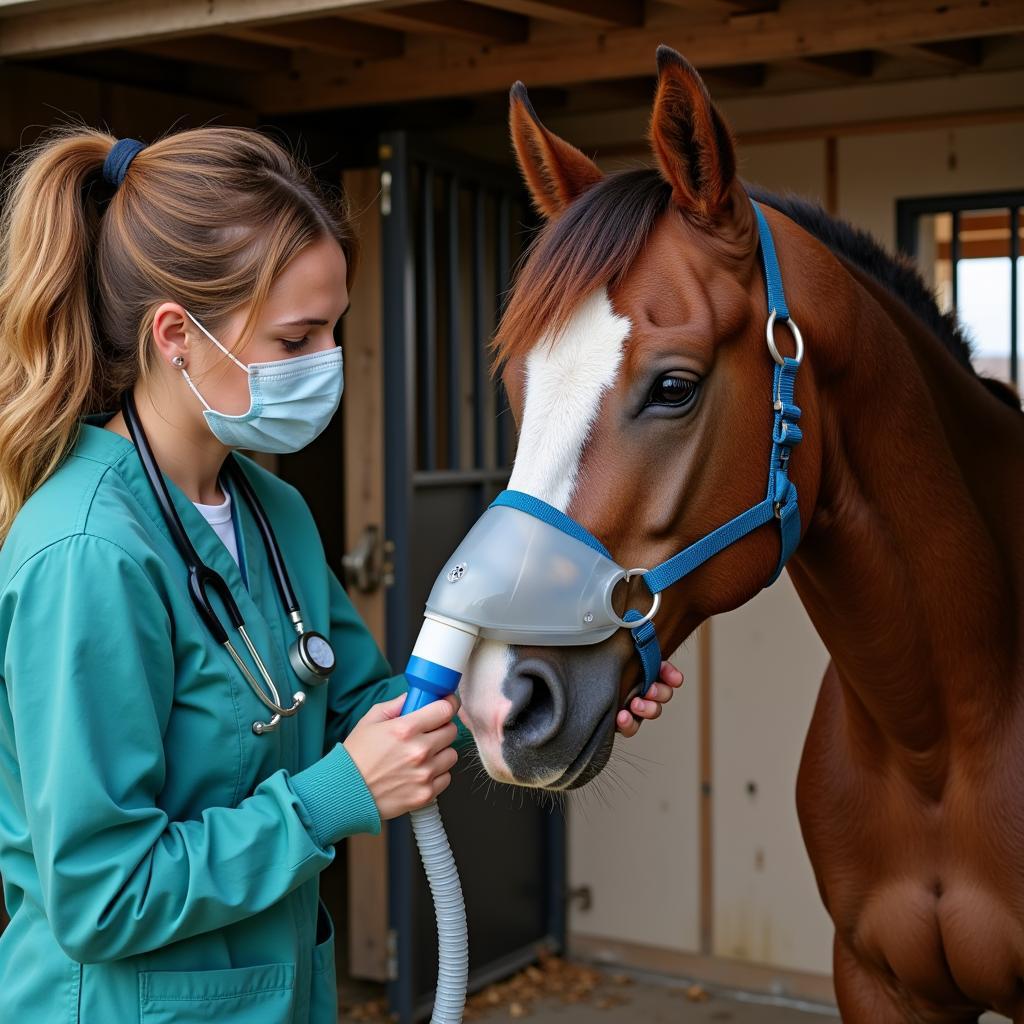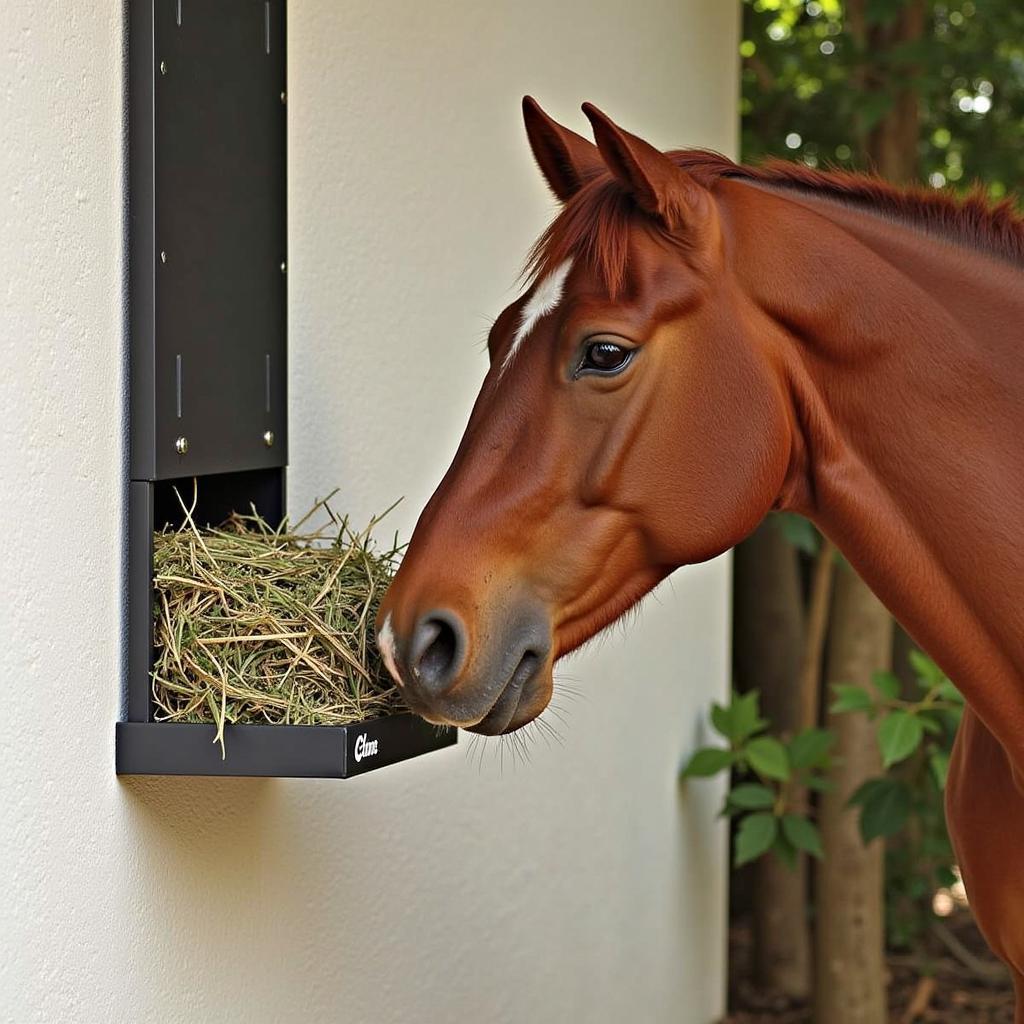Choke in horses occurs when food becomes lodged in the esophagus, obstructing the airway and potentially leading to serious complications. While immediate intervention is crucial to resolve the obstruction, horse owners should be aware of potential after-effects that may arise.
Understanding these after-effects is essential for providing appropriate aftercare and ensuring your horse’s long-term health.
Recognizing Potential Complications
After a horse experiences choke, various complications can occur, ranging in severity. Some horses may show no ill effects after the obstruction is cleared, while others may develop complications requiring further veterinary attention.
Aspiration Pneumonia
Perhaps the most serious concern after choke is aspiration pneumonia. This occurs when food material enters the lungs, causing inflammation and infection. Signs of aspiration pneumonia include:
- Fever
- Coughing
- Nasal discharge
- Difficulty breathing
Aspiration pneumonia requires immediate veterinary care and often necessitates antibiotics, anti-inflammatory drugs, and supportive therapy.
 Horse receiving respiratory therapy
Horse receiving respiratory therapy
Esophageal Damage
The pressure from lodged food can damage the delicate lining of the esophagus. This damage may lead to:
- Esophageal stricture: Narrowing of the esophagus, making it difficult for the horse to swallow
- Esophageal ulceration: Open sores in the esophagus, causing pain and discomfort
- Esophageal perforation: A hole in the esophagus, a life-threatening condition
Signs of esophageal damage may include:
- Reluctance to eat or drink
- Drooling saliva
- Weight loss
- Signs of pain when swallowing
Behavioral Changes
Some horses may develop behavioral changes after a choking episode. These changes often stem from fear or anxiety associated with the experience.
- Reluctance to eat or drink
- Nervousness around feeding time
- Head shyness
Long-Term Management
After a choke episode, proactive management is crucial to support your horse’s recovery and minimize the risk of future occurrences.
Dietary Adjustments:
- Soak hay and feed: Moistening hay and feed makes swallowing easier and reduces the risk of further blockages.
- Feed smaller, more frequent meals: This approach lessens the burden on the esophagus and promotes better digestion.
- Avoid feeding on the ground: Encourage the horse to eat with its head elevated to promote natural swallowing.
 Horse eating soaked hay from an elevated feeder
Horse eating soaked hay from an elevated feeder
Veterinary Follow-Up:
Regular veterinary check-ups are crucial to monitor the horse’s recovery and address any potential complications early on.
Patience and Observation:
Recovering from choke takes time. Owners must remain patient, observant, and attentive to their horse’s behavior and eating habits. Early detection of any abnormalities allows for prompt veterinary intervention and a better prognosis.
When to Contact Your Veterinarian
If your horse exhibits any of the following signs after a choking episode, contact your veterinarian immediately:
- Difficulty breathing
- Coughing
- Nasal discharge
- Fever
- Refusal to eat or drink
- Drooling saliva
- Weight loss
- Signs of pain
Choke in horses can have lasting consequences, but with prompt veterinary care, proper aftercare, and vigilant observation, horse owners can help their equine companions recover and thrive. Remember, early intervention is key to preventing serious complications and ensuring your horse’s long-term well-being.
FAQs
Q: Can a horse choke to death?
A: Yes, choke is a serious condition that can be fatal if the obstruction is not cleared quickly.
Q: How can I prevent my horse from choking?
A: Providing soaked hay and feed, feeding smaller meals, and addressing dental issues can reduce the risk of choke.
Q: Can a horse choke on water?
A: While less common, horses can aspirate water, leading to similar complications as choke.
Need More Help?
For any concerns about your horse’s health, contact Justus Horses USA at 0772127271 or [email protected]. Our team of equine experts is available 24/7 to provide guidance and support. You can also visit us at QGM2+WX2, Vị Trung, Vị Thuỷ, Hậu Giang, Việt Nam.